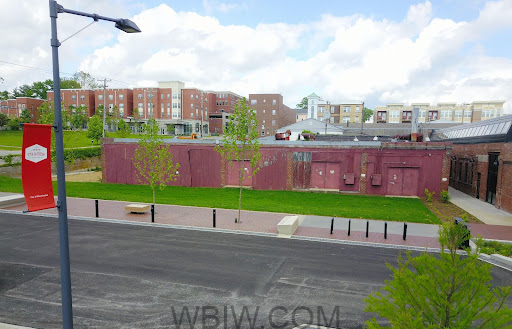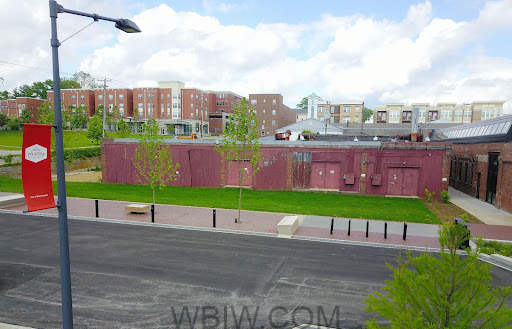
BLOOMINGTON – On November 28, 2022, the City of Bloomington Redevelopment Commission and the Kiln Collective closed the sale of the Showers Brothers Furniture Factory Kiln Building at 642 North Madison Street, setting the stage for the redevelopment of the historic structure.

The Kiln Collective is a collaboration of local investors and businesses who will renovate the structure and occupy it with their respective ventures. These include: SproutBox (Mike Trotzke, Brad Wisler), Soma Coffeehouse & Juice Bar (Bob Costello), Eurton Properties (Shawn Eurton), and Bailey Weiler Design + Build (Craig Bailey, Don Weiler).
The Kiln Collective is purchasing the Kiln from the City of Bloomington Redevelopment Commission for $50,000 and commits to investing an additional $2.0 million in the renovation. The renovations are expected to begin within several months and will be completed in at least two phases. The first will be a ground floor renovation of the original Kiln building to convert it to occupiable space. The second, which is expected to follow within several years, is to add additional build-to-suit stories above the original structure, with the intention of providing space for Mill graduates or companies interested in moving into the Trades District. The renovations have been reviewed and approved in collaboration with the City’s Historic Preservation Commission.
The latest property in the City’s new Trades District to be activated, the 100-year-old Kiln building was originally part of the Showers Brothers Furniture Company complex, serving as a facility for drying lumber to be milled into furniture. The Kiln is listed on the National Register of Historical Places and is also locally designated as part of the Showers Brothers Furniture Factory Historic District. The new owners intend to develop the property as a location where established companies and flourishing startups in development at the Mill and elsewhere may expand. Designs also include restaurant space.
Since the designation of the 65-acre Certified Technology Park in 2005, of which the 12-acre Trades District is part, the site has seen the transformation of the historic Dimension Mill into a business incubator and co-work space. Infrastructure improvements in the form of new streets, walkways, and other environmentally friendly amenities, and a new parking structure already under construction, have made the area a benefit to Bloomington and friendly to visitors utilizing various modes of transportation. An original agreement to purchase the Kiln was delayed in 2020 due to the impact of the COVID-19 pandemic. The Kiln is located within a federally designated Opportunity Zone, which provides tax benefits to those developing the property.
“We look forward to this next step in the evolution of the Trades District,” said Alex Crowley, City of Bloomington Director of Economic & Sustainable Development. “This elegant adaptive reuse of the Kiln, especially in such close proximity to the Mill, will add to the growing vibrancy of activity in the Trades District.”
Renovating and repurposing the Kiln provides an opportunity once again to validate the progressive idea that historic preservation can and should contribute to the continuity and economic well-being of the Bloomington community.
But the conversion of the Kiln into commercial space poses different challenges than other adaptive reuse projects. The building was not constructed to house workers, but to dry lumber. It does not have any windows or any facilities to accommodate a workforce; therefore, compared to the previous Shower campus rehabilitation projects, the renovations to the Kiln will require more substantial changes to the building itself because it was not designed with the light and space necessary for human activity.
Accordingly and with approval from the Historic Preservation Commission, the Redevelopment Commission, and City Staff, the Kiln Collective plans to renovate the building in two phases. The first phase will include the renovation of the existing structure with minimal modifications. The second phase will include adding additional floors above the current structure to expand usable commercial space.
In 2018, the City approached the Historic Preservation Commission to evaluate the possibility of removing the Kiln absent a suitable partner to redevelop the structure. Following a public solicitation for proposals, in February 2020 the City announced a partnership with the Kiln Collective — a consortium of local business owners — based on their vision for saving and repurposing the building to contribute again to Bloomington’s economic vitality.
“The Trades District captures the innovative and collaborative spirit of the Bloomington community,” said Mayor John Hamilton. “Revitalizing this historic structure into a place of light and activity allows us to bring our past into the present while looking toward our bright future.”
Converting the Kiln into commercial space will complement The Mill because the proximity of the Kiln makes it an ideal space for businesses in The Mill to grow as they expand. Also, the Kiln creates a great opportunity for retail and restaurant spaces to further invigorate the energy generated by Upland Brewery and headquarters on the opposite side of 11th Street.



